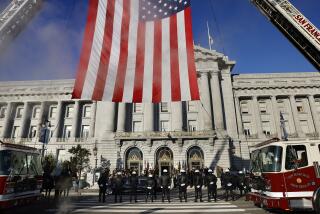Ed Koch remembered as ‘Uncle Eddie’ and a savior of New York
- Share via
NEW YORK -- To his family, Ed Koch was “Uncle Eddie.”
To New Yorkers, he was “hizzoner,” the omnipresent three-term mayor who was remembered Monday as the man who lifted a grim city to glory but who always had time for his nieces, nephews, and a dizzying array of friends ranging from his Greenwich Village neighborhood to the White House.
Koch died Friday at 88 of congestive heart failure, 23 years after leaving City Hall, but anyone who doubted his pull after so many years out of office had to look only at the faces inside Temple Emanu-El in Manhattan. Former President Bill Clinton, Gov. Andrew Cuomo, and Mayor Michael R. Bloomberg sat in front alongside ex-Gov. George Pataki and ex-mayors David Dinkins and Rudy Giuliani. New York’s U.S. senators, Charles E. Schumer and Kirsten E. Gillibrand, attended, along with countless city officials past and present.
PHOTOS: Notable deaths of 2013
“Ed ... has got to be loving all this attention,” said Bloomberg, drawing the first of many loud laughs from a crowd of about 2,500, who were there as much to mourn Koch as to celebrate his outsized life. Speakers, who ranged from Clinton and to a grandnephew of Koch, recalled his many sides -- from that of a politician determined to lift his city back from the brink of financial ruin, to the uncle who never missed a family dinner, a soccer game, or an important recital.
He even made time for a manicure with one of his grandnieces, said Koch’s grandnephew, Noah Thayer, one of seven grandnieces and grandnephews of the late mayor.
“To me, he will always be Uncle Eddie,” Thayer said after other relatives opened a door to a personal side of Koch rarely seen despite his very public life: He had an “uncanny ability” to fall asleep just about anywhere, he never showed up at family dinners without bags full of bagels and lox or other New York deli fare, and he spoke daily -- and ate weekly -- with his younger sister, Pat Thayer.
But in his professional life, Koch was known more for his sharp wit and impatience with naysayers than for being warm and fuzzy.
His former law partner, Jim Gill, who worked with Koch after he left office in 1990, recalled the ex-mayor’s biting yet polite response to a letter from a critic of his politics. “Dear Madam,” Koch wrote. “You are entitled to your opinion of me, and I am entitled to my opinion of you. My opinion of you is that you are a fool. All the best, Ed.”
John Lo Cicero, who met Koch in 1963 in Greenwich Village and was his deputy mayor for a time, recalled Koch’s delight in shocking people with his bluntness and humor. At a human rights parade, Lo Cicero said, Koch turned to the counsel to the Chinese government and “out of the blue” told him: “If you’d like to defect, I would help you!”
“Ed could be exasperating,” Lo Cicero recalled. “I would warn him, ‘Stay clear’ of a certain subject, and what would he do?” Koch, he said, would immediately launch into an impassioned stand on the taboo subject in his “high-pitched and somewhat grating voice.”
“He didn’t cater to anyone, and that came through,” Lo Cicero said.
Clinton held up a thick stack of papers that he said were printouts of the letters Koch had sent him during his presidency. Koch by then was out of office but weighed in on his pet projects, from combating smoking among young people to fighting childhood obesity.
Even as his own health declined in December, Clinton said, Koch rarely spoke of his own problems and instead asked about Hillary Clinton’s health after her recent concussion and blood clot. “He had a big brain, but he had a bigger heart,” said Clinton, who had been in touch with Koch shortly after the ex-mayor’s 88th birthday on Dec. 12.
As in past years, it was celebrated with a big party, something friends said Koch demanded even if he did not live to see it himself. Koch was released from the hospital two days before the celebration. It was one of several hospitalizations for the ex-mayor in the past year, the last coming on Jan. 28, the day before the New York premier of “Koch,” a documentary about his life. He died three days after the premiere.
“Leave it to Ed to find the best way to maximize publicity for a film about his life,” Bloomberg cracked during his humorous yet moving tribute to the man who shared his passion for New York.
“The New York that Ed inherited is almost unimaginable today,” Bloomberg said, recalling graffiti-filled subways, miles of abandoned buildings, and filthy streets unsafe to walk on even during daylight hours. “New York was in a state of despair,” Bloomberg said. “Then came Koch. Ed held up his hands and said ‘enough!’ ”
As the service ended, six police officers carried Koch’s coffin up the aisle as the organist switched from mournful music to “New York, New York.” The former mayor was being buried in a private service at Trinity Cemetery, a plot he purchased decades ago and which Bloomberg said made perfect sense.
“Just think about it,” he said of Koch. “A Polish Jew in an Episcopal graveyard in a largely Dominican neighborhood. What could be more New York -- or even more Ed Koch?”
ALSO:
In Chris Kyle’s shooting death, postwar worlds collide
Texas judge faces ‘court of inquiry’ into wrongful conviction
Alabama abduction: Sheriff thanks man for ‘taking care of our child’
More to Read
Sign up for Essential California
The most important California stories and recommendations in your inbox every morning.
You may occasionally receive promotional content from the Los Angeles Times.











